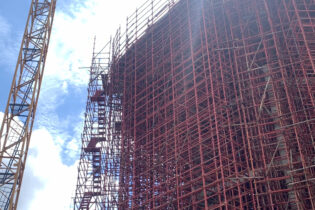The slow pace of economic growth along with government delays in awarding tenders continue to limit the recovery of the local infrastructure and construction sector. The downturn may have given some respite to the scarce skills shortage. However, South Africa is not training enough engineers, artisans and technicians to deliver the long-awaited R845 billion government infrastructure projects in the pipeline.
This is the conclusion of the 2012 Infrastructure Sector Research Survey, carried out by executive search firm Landelahni Business Leaders Amrop SA. “Across the world, crucial infrastructure schemes are competing for a dwindling skills pool amid fears that the skills shortage could delay projects in major markets,” says Landelahni CEO Sandra Burmeister. “Driven largely by China and India, construction is expected to grow globally by 67% over the next eight years. “Meanwhile South Africa’s major construction companies are looking northwards to win a share of the huge infrastructure projects being rolled out across the African continent. “Developing and retaining key technical skills is essential if this country is to meet the challenge of building massive new infrastructure while, at the same time, upgrading existing services.” The 2012 Landelahni Infrastructure Sector Survey researched 75 companies with just over 300 000 permanent employees in the electricity, water, waste, road, rail and ports sectors, as well as consulting engineers, major listed and unlisted construction companies, and large suppliers to the construction industry. Global infrastructure growth“The demand for infrastructure is driven by rising populations and rapid urbanisation, and is causing a shift for all players in the sector,” says Burmeister. “Internationally, recovery is slow, but the outlook is extremely positive between now and 2020.” Construction is expected to grow from US$7.2 trillion (R63.67 trillion) to US$12 trillion in 2020, driven largely by emerging markets. An Oxford Economics survey estimates that construction will account for 13.2% of global GDP by 2020. “The South African government’s ambitious infrastructure drive is intended to jump start growth,” says Burmeister. “The Medium-Term Expenditure Framework (MTEF) has set aside R845 billion for public sector infrastructure projects with a further R3.2 trillion infrastructure projects under consideration up to 2020. “So far, around 25% of these are being financed and implemented. This means a R250 billion spend per year – about R100 billion more than the average spent over the past five years, including the FIFA World Cup.” Growth in sub-Saharan Africa is expected to be about 14% higher than that in South Africa. On the African continent US$20 billion in infrastructure projects are already under way. According to the 2012 KMPG Global Construction Survey: “New infrastructure projects are expected to be on a huge scale, so size and global reach will matter. With scale comes complexity as global players navigate tough political, commercial, regulatory and governance environments.” “This calls for advanced leadership skills,” says Burmeister. “Winning new contracts is increasingly about having the right expertise. We need to develop enough skills to ensure proper maintenance and timeous upgrades of existing infrastructure, and to avoid further deterioration of essential services across the country.” Infrastructure supply constraints
In government, engineering skills have reached a new low, with a recent Consulting Engineers South Africa (CESA) report estimating that there are only 1 800 engineers across government (excluding state-owned entities) and more than 1 000 engineering posts are vacant. The National Treasury reports that in 2010/11, government spent only 68% of its total capital budget. “Ramping up government capacity to implement R3.2 trillion of mega-projects is an enormous challenge and is likely to result in an increase of public-private partnerships,” says Burmeister. “We are already relying on international partners to bring expertise not available locally – as we see with Gautrain, the building of new coal-fired power stations, nuclear energy initiatives and the drive for alternative energy.” Skills shortages
“Skills shortages are rated the major risk of doing business in emerging economies. The battle for skilled resources is likely to intensify – globally and locally.”
Total employment in the local infrastructure sector grew from 634 000 in 2001 to 1.2 million in 2007, dropping to 1.1 million in 2010. While the slump in construction activity alleviated the skills shortage to some extent, research shows that 74% of companies are still struggling to fill engineering vacancies. The current order book of South African-listed construction companies is over R430 billion.
“We simply do not have the right kinds of skills to meet the specific demands of huge new infrastructure projects,” says Burmeister. “We continue to face the dichotomy of high unemployment among the unskilled and semi-skilled, and high vacancy rates for the highly skilled. It is critical that companies spend time and money on developing a leadership and graduate pipeline as well as a supply of professional and skilled workers, including artisans.” Local labour market supply: Engineering graduatesOf the 600 000 candidates who wrote school-leaving examinations in 2009, only 22% passed maths higher grade and only 7% passed physical science higher grade. In the same year, only 28% of students in public higher education institutions were enrolled for programmes in science, engineering and technology. Total graduations (degrees and diplomas) across all engineering disciplines between 1998 and 2010 numbered 70 475, at a 13.8% pass rate. Of this total, 29 280 engineers graduated with degrees from universities, an average of 2 252 per year. “There was an upward trend for black and female engineering graduates, which is positive,” says Burmeister. “However, the average university pass rate is 16%, far below the international average of 25%.” These figures compare with 1.9 million engineering graduates a year in China in 2010, 763 635 in India and 10 765 in the United Kingdom. Infrastructure-specific graduates
In the case of infrastructure specific studies, in 2010 electrical engineering university graduates numbered 899, followed by civil engineering at 847 and mechanical engineering at 766. “Last year the Engineering Council of South Africa (ECSA) launched a national initiative to tackle the chronic shortages of engineering skills, in line with government’s somewhat ambitious plan to develop 30 000 engineers by 2014,” says Burmeister. “This initiative remains severely hampered by the low maths/science pass rates at school level and the low graduation rate of engineering students. “We should guard against getting into the same situation as China, where only about 10% of the vast number of graduate engineers is considered globally employable. Instead we need to focus on producing high-quality engineers who can meet market demand in specific areas, and not lower standards to drive numbers that look good on paper.” The number of candidate engineers is relatively robust at 5 600. However, according to ECSA, the conversion rate to professional engineers is low because lean organisations are not committing resources to the required three to four years of on-the-job mentoring. Training
The infrastructure sector has continued to invest in skills training despite the economic downturn and has made a significant investment particularly at executive level. The industry has increased expenditure on the training of artisans and technicians. However, bursary spend in 2011 was around only 0.2% of payroll. Burmeister believes the skills challenge is exacerbated by the presence of 35 000 small and medium contractors that have little capacity to train and develop staff. “Training will continue to be carried out by large contractors, listed construction companies and parastatals.” Planning for infrastructure growth and sustainability
“There is growing global demand for specialist engineering skills to deliver on new mega-projects,” says Burmeister. “With this comes increased demand for professionals in risk management, information technology professionals able to support business and systems efficiencies, and executives capable of leading across multiple geographies and cultures.” Alongside the Presidential Infrastructure Coordinating Commission 20-year infrastructure plan, Burmeister believes we need a roadmap of the skills needed to invest in today. “First, we must align our educational systems to meet these requirements,” she says. “Only in this way can we ensure that we have skills to support not just the build, but the maintenance and upgrade of infrastructure now and in the future. Further investment and spend in skills development is not just a scorecard measure. It’s an economic imperative for a sustainable infrastructure industry.”






